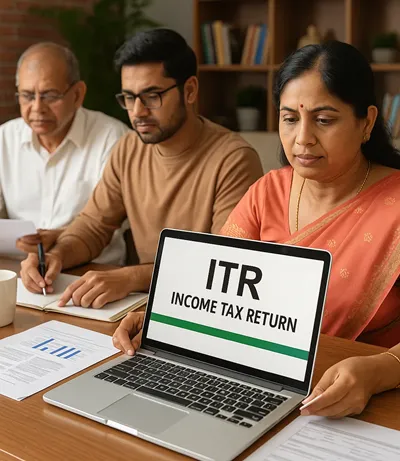How Income Tax Act Affects Your Salary, Investments & Gifts.

The principal enactment tax, from which income derived from any source has to be taxed in India and that is applicable to ascertainable entities including individuals and businesses, is the Income Tax Act, 1961. According to this law, entities with income earning different sources, such as salary, rent, business or investment, would rather pay tax to the government on the grounds of income they earn in a year from member sources.
Classification provides income under five heads: salary, house property, business or profession, capital gains (e.g., sale of shares or property), and other sources (e.g. Interest). Furthermore, under this provision, there are deductions ex. Home loans, Medical expenses, and so on, which minimise taxable income. This implies that every year, a taxpayer has to file an income-tax return (ITR), which the government is in a position to scrutinise or assess.
Key Highlights:
- Applies to all: Individuals, companies, firms, HUFs, etc.
- Tax depends on income slab: The more you earn, the higher the tax rate.
- Exemptions and deductions: Like Section 80C (for investments), 80D (for health insurance), etc.
- TDS (Tax Deducted at Source): Tax is cut directly from salary, interest, etc.
- ITR Filing: You must file your return each year if you meet the income limit.
- Penalties: There are fines for not paying tax or filing returns late.
Income Tax Act, 1961 – FAQs
-
1. I work in a private company. Do I need to file income tax?
-
Yes, if your total annual income is above the exemption limit (currently ₹2.5 lakh for most individuals), you must file your Income Tax Return (ITR).
-
2. I only earn through rent from my house. Is it taxable?
-
Yes, rental income is considered under "Income from House Property" and is taxable.
-
3. I am a freelancer. How will my income be taxed?
-
Freelancers are taxed under "Income from Business or Profession". You can deduct your business expenses too.
-
4. What is TDS, and why is it deducted from my salary?
-
TDS (Tax Deducted at Source) is the tax your employer cuts from your salary every month and pays to the government on your behalf.
-
5. I made a profit by selling shares. Do I have to pay tax on it?
-
Yes. Profits from shares are called capital gains and are taxable based on how long you held them.
-
6. I earn less than ₹2.5 lakh per year. Do I need to file a return?
-
It’s not mandatory, but filing a return can help in getting loans or claiming refunds later.
-
7. Can I save tax by investing in LIC or PPF?
-
Yes, investments in LIC, PPF, ELSS, etc. qualify for deduction under Section 80C (up to ₹1.5 lakh per year).
-
8. How can I file my Income Tax Return (ITR)?
-
You can file it online on the income tax website or take help from a CA or tax expert.
-
9. I forgot to file my ITR last year. What can I do now?
-
You can file a "belated return", but you may have to pay a late fee and interest.
-
10. I received money as a gift. Is it taxable?
-
Gifts above ₹50,000 (not from relatives or on special occasions) are usually taxable.
-
11. I paid for my parents' health insurance. Can I claim a deduction?
-
Yes, under Section 80D, you can claim a deduction for health insurance premiums paid for yourself, your spouse, children, and parents.
-
12. I took a home loan. Will I get tax benefits?
-
Yes. You can claim deductions on both principal (under 80C) and interest
-
13. My employer gave me HRA. Can I get tax exemption?
-
Yes, if you live in a rented house and meet the conditions, HRA can be partially exempt from tax.
-
14. What if I made a mistake in my ITR?
-
You can file a "revised return" to correct any errors in the original return.
-
15. I am a pensioner. Do I have to file taxes?
-
Yes, a pension is considered income and is taxable like a salary.
-
16. I received a refund last year. Will I be taxed on it?
-
No. Income tax refunds are not taxable.
-
17. What is the last date to file ITR?
-
Usually, it is 31st July of the following financial year, unless extended by the government.
-
18. Can I file ITR without Form 16?
-
Yes, if you have salary slips or bank statements, you can still file the return.
-
19. I am a student, but I earn from YouTube/Instagram. Do I need to pay tax?
-
Yes, if your total income exceeds the exemption limit, you must pay tax.
-
20. What happens if I don’t pay tax?
-
You may face penalties, interest on dues, and even legal action in serious cases.
Add new comment